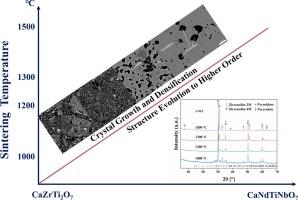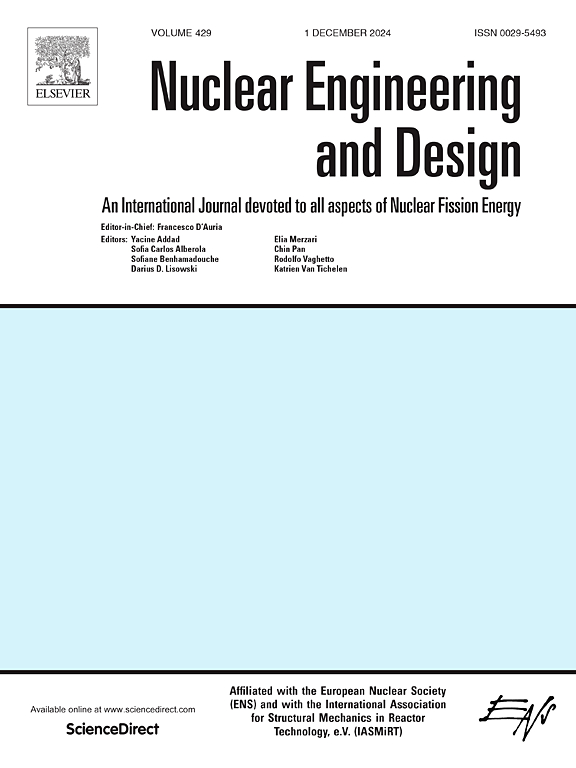Effect of sintering temperature on crystal growth and evolution of CaZrTi2O7–CaNdTiNbO7 ceramics: Minor actinides immobilization host materials
IF 1.9
3区 工程技术
Q1 NUCLEAR SCIENCE & TECHNOLOGY
引用次数: 0
Abstract
Regulation of microstructure and processing cost of waste form are important for the design and application of high-level radioactive waste immobilization. In this study, CaZrTi2O7 (zirconolite) – CaNdTiNbO7 (pyrochlore) ceramics were synthesized via conventional sintering method at 1000–1500 °C to investigate the effect of sintering temperature on the microstructure, solidification, and crystal evolution. The powder x-ray diffraction (XRD) and backscattered scanning electron microscopy–energy dispersive spectroscopy (BSEM–EDS) results indicated gradual formation of zirconolite and pyrochlore ceramics, following with their densification when increasing sintering temperature. It was found that sintering temperature should be higher than 1300 °C to form zirconolite-pyrochlore solid solutions. Densified pyrochlore was obtained at 1500 °C. In addition, transformation from relatively low-symmetry lattice to higher-symmetry lattice was found with an increase in sintering temperature. Furthermore, higher temperature can enhance the crystal growth and densification in the ceramic composite. The finding in this study could provide important suggestions to design and process zirconolite-pyrochlore waste forms for industrial application.

烧结温度对 CaZrTi2O7-CaNdTiNbO7 陶瓷晶体生长和演化的影响小锕系元素固定化主材料
调节废物形态的微观结构和加工成本对于高放射性废物固定化的设计和应用非常重要。本研究采用传统烧结方法,在 1000-1500 ℃ 下合成了 CaZrTi2O7(锆英石)- CaNdTiNbO7(火成岩)陶瓷,研究了烧结温度对微观结构、凝固和晶体演化的影响。粉末 X 射线衍射(XRD)和背散射扫描电子显微镜-能量色散光谱(BSEM-EDS)结果表明,随着烧结温度的升高,锆英石和火成岩陶瓷逐渐形成,并逐渐致密化。研究发现,烧结温度应高于 1300 ℃,才能形成锆英石-绿柱石固溶体。在 1500 ℃ 时可获得致密化的热绿石。此外,还发现随着烧结温度的升高,相对低对称晶格向高对称晶格转变。此外,更高的温度还能促进陶瓷复合材料中晶体的生长和致密化。本研究的发现可为设计和加工工业应用的锆英石-钾长石废料形式提供重要建议。
本文章由计算机程序翻译,如有差异,请以英文原文为准。
求助全文
约1分钟内获得全文
求助全文
来源期刊

Nuclear Engineering and Design
工程技术-核科学技术
CiteScore
3.40
自引率
11.80%
发文量
377
审稿时长
5 months
期刊介绍:
Nuclear Engineering and Design covers the wide range of disciplines involved in the engineering, design, safety and construction of nuclear fission reactors. The Editors welcome papers both on applied and innovative aspects and developments in nuclear science and technology.
Fundamentals of Reactor Design include:
• Thermal-Hydraulics and Core Physics
• Safety Analysis, Risk Assessment (PSA)
• Structural and Mechanical Engineering
• Materials Science
• Fuel Behavior and Design
• Structural Plant Design
• Engineering of Reactor Components
• Experiments
Aspects beyond fundamentals of Reactor Design covered:
• Accident Mitigation Measures
• Reactor Control Systems
• Licensing Issues
• Safeguard Engineering
• Economy of Plants
• Reprocessing / Waste Disposal
• Applications of Nuclear Energy
• Maintenance
• Decommissioning
Papers on new reactor ideas and developments (Generation IV reactors) such as inherently safe modular HTRs, High Performance LWRs/HWRs and LMFBs/GFR will be considered; Actinide Burners, Accelerator Driven Systems, Energy Amplifiers and other special designs of power and research reactors and their applications are also encouraged.
 求助内容:
求助内容: 应助结果提醒方式:
应助结果提醒方式:


